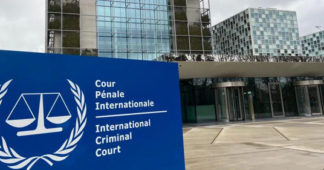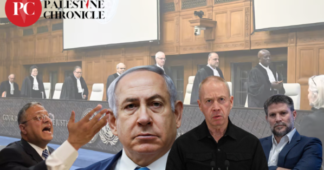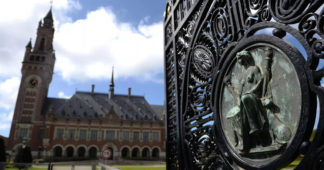By Marwan Emil Toubasi
Judges at the top United Nations court IJC ordered Israel to halt its offensive in the southern Gaza city of Rafah and withdraw from the enclave, in a case brought by South Africa accusing Israel of genocide, citing “immense risk” to the Palestinian population.
Friday’s decision marked the third time this year the 15-judge panel has issued preliminary orders seeking to rein in the death toll and alleviate humanitarian suffering in Gaza. While orders are legally binding, the court has no police to enforce them.
Benjamin Netanyahu’s potential visit to the US Congress, which will come after the ICJ decision and which was announced by US House of Representatives Speaker Mike Johnson, raises many repercussions on several levels, including on US domestic policies, the internal Israeli position and relations with US allies from Arab countries.
Within hours of the Prosecutor of the International Criminal Court, Karim Khan, announcing a request to issue arrest warrants against Benjamin Netanyahu and his Defense Minister Yoav Galant on charges of war crimes and crimes against humanity, American lawmakers rushed to find ways to attack the International Criminal Court, as previously the International Court of Justice. In the case against the occupying state.
Mike Johnson himself, Speaker of the US House of Representatives, announced his effort to pass legislation to impose sanctions on the International Criminal Court. For his part, Secretary of State Anthony Blinken, in his testimony before the Senate Subcommittee, expressed his readiness to work with all members of Congress on a bipartisan basis to impose sanctions on the International Criminal Court, which are threats aimed at attempts to delegitimize the International Criminal Court as well as the International Court of Justice and to undermineTheir authorities are in clear and immoral violation of the principles of justice and democracy that Americans pay lip service to, on the one hand, and to impose the ready-made accusation of anti-Semitism on those institutions as well as on others.
This anticipated visit by Netanyahu, which comes after his previous visit to Congress in 2015, which sparked controversy at the time, and at a sensitive time in which the Israeli war of genocide and ethnic cleansing is witnessing a major and dangerous escalation against our Palestinian people, especially with the implementation of war crimes in Gaza and the West Bank camps and the occupation’s threats to undermine all forms of life, which enhancesIt is important to understand the dimensions and effects of this potential visit, which is likely to be implemented soon.
Although the details and date of the invitation have not yet been determined, the Biden administration is working today to create the atmosphere by developing the American proposal with a “contact group” of its allies and agents in the Middle East with the aim of agreeing on a unified policy for managing the Gaza Strip after the so-called “the next day,” according to what an official in the Middle East said. Biden administration. Which may mean repeating the issue and tragedy of Iraq after its occupation by appointing an American governor in Gaza, “Primer II,” agreed upon by the contact group after exerting all forms of political pressure and taking measures on the ground against the resistance of our people and their political leadership that aims to integrate with the genocidal aggression in Gaza.
This is being done in an attempt to circumvent the history, meaning, and representative essence of the PLO, the path of international legitimacy, and the national rights of our people in their right to self-determination and the establishment of their independent, democratic, sovereign state on the basis of the unity of the land, the people, and the single cause.
On the other hand, regarding the visit, on the internal American level, it is expected that Netanyahu’s visit will reinforce these already existing partisan divisions. Republicans, who tend to support Israel unconditionally, will see the visit as confirmation of their policies and use it to strengthen their position against the Biden administration, which faces criticism from within the Democratic Party itself, which is exposed to a horizontal division regarding the relationship with Israel between its supporters and the progressive wing of the party that calls for taking a position. More critical towards Israel and defining relations with it. This could lead to increased tensions and protests in the American street, especially by pro-Palestinian groups that see US support for Israel as complicating the efforts required to immediately stop the aggression of the occupying state to achieve peace, and to an increase in the size of popular street demonstrations and student movement protests. rising in universities.
Netanyahu’s speech could also play a role in influencing the upcoming election campaigns for the two parties, as politicians from both parties may use it to strengthen their positions among voters. Republicans may use the event to bolster their image as defenders of a close strategic ally, while progressive Democrats may use it to highlight the need for a more balanced and more critical American foreign policy toward Israel, which will affect the chances of the bad Biden in favor of the bad Trump.
As for the Israeli political party scene, this visit may strengthen Netanyahu’s political position, which he needs now in the face of internal opposition to him and the worsening party crisis. Success in obtaining strong American support will be used to confirm the legitimacy of his leadership and strengthen his position as a leader who maintains strong relations with Israel’s most important ally.
On the other hand, this may lead to an increase in political divisions within the Israeli occupying state. The opposition could see this visit as an attempt to divert attention from controversial internal issues, such as the ongoing investigations against Netanyahu, the proposed judicial reforms, the existing disputes between the security and political levels today, and the ongoing exchange of accusations between them.
At the regional level, Netanyahu’s visit is likely to deepen suspicions and tensions between the United States and its Arab allies. Especially those Arab countries that have recently normalized relations with the Israeli occupation state, such as the UAE and Bahrain, may find themselves under internal pressure from groups opposing normalization on the one hand. On the other hand, there is tension with some Arab countries that oppose the Israeli aggression in Gaza. But certainly this visit could further complicate the situation and arouse the dissatisfaction of the Arab peoples who support the rights of our Palestinian people.
At the same time, the visit can be seen as a step to strengthen the American-Israeli strategic alliance against common threats in the region, first and foremost the existential threat in addition to the Iranian threats that they do not stop talking about, and to embody the ideological alignment around the Zionist vision and the implementation of the Greater Israel project. Which may push some Arab countries to strengthen their cooperation with the United States and Israel or re-evaluate their relations with the United States based on their strategic interests and international alignments.
Finally, I believe that this visit aims to influence international efforts to hold Israel accountable for human rights violations, genocide, starvation, and displacement in Palestine, leading to its impunity.
The common position of the United States and Israel in rejecting international judicial legitimacy, as is the case with the International Criminal Court and the International Court of Justice, may enhance the difficulty of achieving international accountability and increase the complexity of the humanitarian and political situation in the region.
In short, Netanyahu’s possible visit to the US Congress reflects the political identification and approach of the great racist colonial thought between the United States and Israel. Both visions stem essentially from the intersections of political thought that was based on ethnic cleansing, displacement, and racist practices of settling groups in place of peoples. Another indigeneity in the two places, America and Palestine, despite their geographical distance.
We remind our readers that publication of articles on our site does not mean that we agree with what is written. Our policy is to publish anything which we consider of interest, so as to assist our readers in forming their opinions. Sometimes we even publish articles with which we totally disagree, since we believe it is important for our readers to be informed on as wide a spectrum of views as possible.











